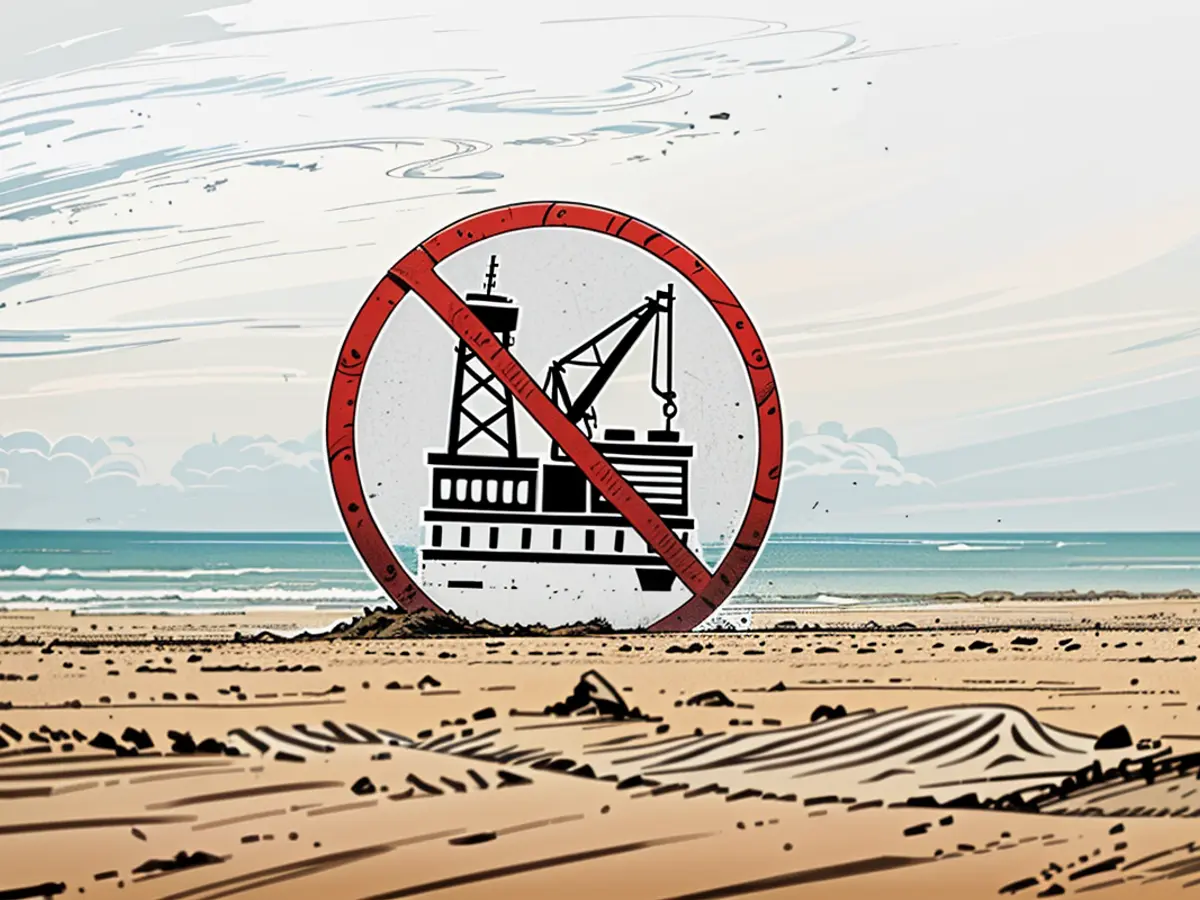- Federal government must decide on gas production before Borkum
The controversial gas extraction project off the North Sea island of Borkum has become a case for the federal government. While the responsible Lower Saxony state agency has granted the Dutch energy company One-Dyas a 18-year permit, an agreement between Germany and the Netherlands is also required for the drillings that extend into German territory. Environmental organizations plan to continue challenging the project legally.
The federal government is facing pressure from groups like Fridays for Future and Greenpeace. Climate activist Luisa Neubauer stated that Federal Economics Minister Robert Habeck and Foreign Minister Annalena Baerbock (both Greens) must now show whether they stand "on the side of a fossil climate dirt company or on the side of people, the environment, and the energy transition." If Germany approves a new gas field, it would be impossible to justify expecting other countries to adhere to the international commitment to phase out coal, oil, and gas.
Habeck wants to wait for court decisions on the gas project
Economics Minister Habeck reacted cautiously to the permit granted by the Lower Saxony State Agency for Mining, Energy, and Geology, stating that he wants to wait for possible court decisions. "This is not a legally binding decision today, it will certainly be challenged," the Green politician said in Berlin. Only after the relevant verdicts have been issued will it be decided whether the agreement between Germany and the Netherlands will be signed.
"It's a relatively small gas field," said Habeck. "It's less than the annual German gas consumption and will span over decades." The effect on energy security or prices would be minimal at most. "And it's a very, very sensitive ecological area," Habeck emphasized. The Wadden Sea National Park is "a pearl in nature conservation." In the event of gas extraction, the UNESCO World Heritage site could be withdrawn.
SPD MP Nina Scheer said that gas drilling off Borkum must be "indispensable." "Anything else is neither justifiable in terms of climate policy nor with regard to the natural heritage of the Wadden Sea." The Federal Ministry of the Environment had already stated before the agency's decision that it saw the "cementing of fossil infrastructures" critically and a possible permit "with a view to marine protection with concern."
Environmental organizations and the city of Borkum protest
An alliance around the German Environmental Aid has announced that it will exhaust all legal means against the project. The environmental organization BUND Lower Saxony stated that the permit is a catastrophe for the North Sea and the Wattenmeer. Besides Environmental Aid and BUND, the citizens' initiative Clean Air East Frisia also belongs to the alliance. The partners had recently succeeded in preventing a power cable for the drilling platform from being laid temporarily at the Administrative Court in Oldenburg.
The city of Borkum also announced that it would examine legal steps. The permit is "a heavy blow against the UNESCO World Natural Heritage site, the Lower Saxony Wadden Sea National Park, and thus for the livelihoods of the island's inhabitants," said the independent mayor Jürgen Akkermann.
Lower Saxony sees the final decision with the federal government
Lower Saxony's state government passed the responsibility on to Berlin. The state only had the task of a supervisory authority in the procedure, the final decision lies with the federal government, said Economics Minister Olaf Lies. "These are ultimately also energy and geostrategic decisions that the federal government must make," said the SPD politician.
The Minister of Environment and Energy of the state, Christian Meyer of the Greens, stated that his critical stance on the project has not changed. From the perspective of climate protection, new fossil gas or oil extractions are unnecessary.
The Lower Saxony State Agency announced that the permit has been granted following examination and approval by the Ministry of Economics in Hannover. It was agreed that the extraction would end prematurely as soon as the targeted energy transition in Germany no longer requires natural gas as an energy carrier. "However, as long as natural gas is still consumed in Germany, the following applies: The natural gas extracted from domestic storage facilities is significantly less harmful to the climate than imported gas," said the President of the Agency, Carsten Mühlenmeier.
Up to 13 billion cubic meters of gas
The company One-Dyas plans to begin extracting natural gas from a field near the islands of Borkum and Schiermonnikoog this year. A production platform will be constructed on Dutch territorial waters approximately 20 kilometers northwest of Borkum. The highest court in the Netherlands has given the green light for this. With the decision of the Lower Saxony State Agency, the permit is now also in place on the German side.
Drilling is planned to be carried out at a depth of 1.5 to 3.5 kilometers, deflecting from Dutch territory into German territory. The expected recoverable amount of natural gas for the entire project is estimated at 4.5 to 13 billion cubic meters. For comparison: According to figures from the Federal Network Agency, around 81 billion cubic meters of gas were consumed in Germany alone last year.
Habeck noted that the gas field is relatively small, with less annual German gas consumption compared to the estimated recovery. He also highlighted the environmentally sensitive area of the Wadden Sea National Park, a UNESCO World Heritage site, which could be impacted by gas extraction.
The city of Borkum, expressing concern over the permit, announced they would examine legal steps, citing the potential harm to the UNESCO World Natural Heritage site and the inhabitants' livelihoods.








